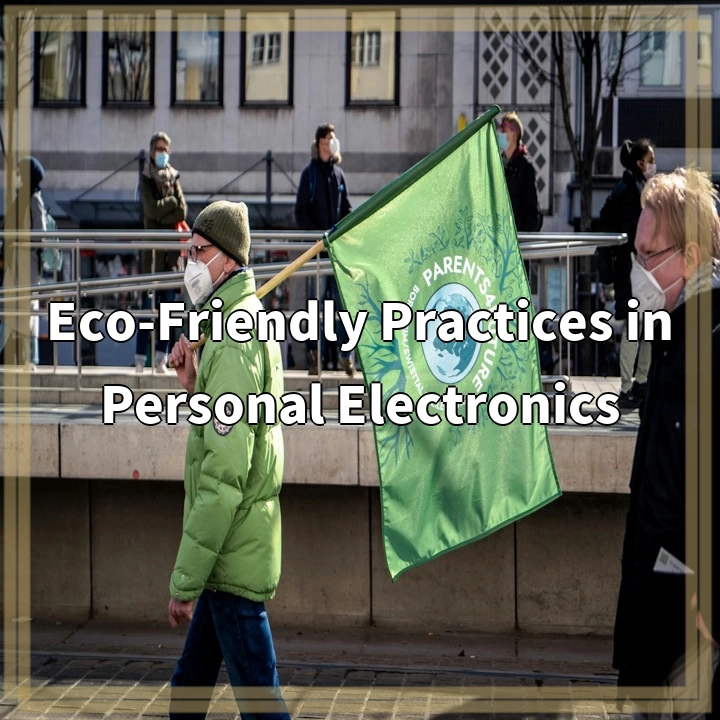
What is Eco-Friendly Practices in Personal Electronics?
Personal electronics have become an integral part of our lives, from smartphones and laptops to tablets and wearable devices. With the rapid advancement of technology, the production and consumption of personal electronics have skyrocketed. However, this has also resulted in a significant environmental impact, including resource depletion, e-waste generation, and pollution. Eco-friendly practices in personal electronics aim to minimize these negative effects by adopting sustainable approaches throughout the lifecycle of these devices.
Real-World Problems Associated with Eco-Friendly Practices in Personal Electronics
Despite the growing awareness of environmental issues, the personal electronics industry still faces various challenges in achieving eco-friendly practices. These problems include:
1. Planned Obsolescence:
Planned obsolescence is a business strategy where companies intentionally design and manufacture devices with a limited lifespan. This encourages consumers to replace their gadgets more frequently, contributing to increased e-waste generation and resource depletion.
2. E-Waste Management:
E-waste, which includes discarded electronic devices, poses a significant environmental threat due to the hazardous substances they contain. Improper disposal and lack of effective e-waste management systems can lead to pollution and health risks, especially in developing countries.
3. Supply Chain Transparency:
The personal electronics industry has a complex supply chain that involves multiple stakeholders and processes. Ensuring transparency and accountability throughout this chain can be challenging, making it difficult to trace the origin of raw materials, assess the environmental impact of manufacturing, and verify ethical labor practices.
4. Energy Efficiency:
Personal electronic devices often consume substantial amounts of energy, contributing to greenhouse gas emissions and increasing dependence on fossil fuels. Enhancing energy efficiency in the manufacturing, usage, and disposal of these devices is crucial to minimize their carbon footprint.
5. Recycling and Circular Economy:
Implementing effective recycling systems and promoting a circular economy approach is crucial in reducing the environmental impact of personal electronics. However, the lack of awareness, infrastructure, and incentives for recycling and sustainable product design remains a significant challenge.
By addressing these real-world problems and adopting eco-friendly practices in personal electronics, we can mitigate the environmental impact and move towards a more sustainable future.

Solutions for Eco-Friendly Practices in Personal Electronics
To address the challenges associated with eco-friendly practices in personal electronics, we need to implement the following solutions:
1. Sustainable Design and Extended Product Lifespan:
Manufacturers should prioritize sustainable design principles, including modular designs, upgradeability, and the use of eco-friendly materials. By promoting repairability and extending the lifespan of devices, we can reduce e-waste and minimize resource consumption.
2. Consumer Education and Awareness:
Raising awareness among consumers about the environmental impact of personal electronics is crucial. Educating them about responsible purchasing decisions, recycling options, and proper e-waste disposal can encourage sustainable practices.
3. E-Waste Recycling and Proper Disposal:
Implementing efficient e-waste recycling programs is vital to ensure proper disposal of electronic devices. Collaboration between manufacturers, governments, and recycling facilities can help establish convenient and accessible collection points for consumers.
4. Supply Chain Transparency and Ethical Practices:
Increasing supply chain transparency is essential to address environmental and social issues associated with personal electronics. Companies should establish traceability systems, assess the environmental impact of their operations, and promote fair labor practices.
5. Energy Efficiency and Renewable Energy Usage:
Promoting energy-efficient manufacturing processes, encouraging energy-saving features in devices, and transitioning to renewable energy sources can significantly reduce the carbon footprint of personal electronics.
6. Collaboration and Industry Standards:
Collaboration between industry stakeholders, governments, and environmental organizations is crucial in driving sustainable practices. Developing and implementing industry-wide standards and certifications can help ensure that personal electronics adhere to strict environmental and ethical criteria.
By implementing these solutions, we can foster a more sustainable approach to personal electronics, minimizing their environmental impact while still enjoying the benefits of technological advancements.















